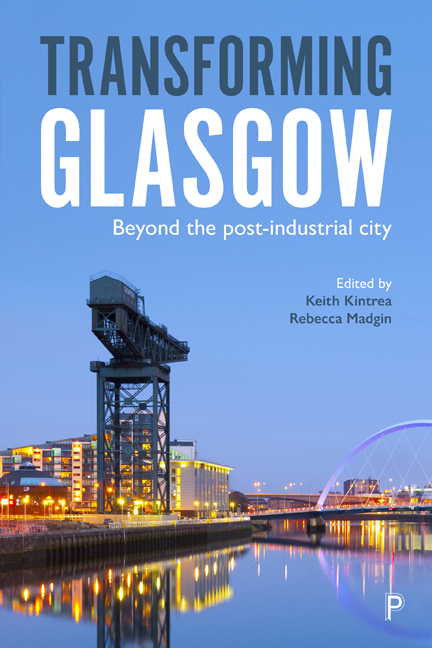Book contents
- Frontmatter
- Contents
- List of Maps, Tables, Figures and Boxes
- Notes on Contributors
- Acknowledgements
- Foreword
- Map
- Introduction: Transforming Post-Industrial Glasgow – Moving Beyond the Epic and the Toxic
- PART I
- PART II
- PART III
- Conclusion: Beyond the Post-Industrial – Narratives of Time and Place
- Index
9 - Changing Places and Evolving Activism: Communities in Post-Industrial Glasgow
Published online by Cambridge University Press: 25 March 2021
- Frontmatter
- Contents
- List of Maps, Tables, Figures and Boxes
- Notes on Contributors
- Acknowledgements
- Foreword
- Map
- Introduction: Transforming Post-Industrial Glasgow – Moving Beyond the Epic and the Toxic
- PART I
- PART II
- PART III
- Conclusion: Beyond the Post-Industrial – Narratives of Time and Place
- Index
Summary
Introduction
Glasgow's history through the 20th century and into the 21st is one of immense changes in places, neighbourhoods and communities. From the slum clearances and creation of peripheral estates, through to contemporary changes such as the Red Road flats demolition and the building of the Commonwealth Games Village, whole areas of the city have been transformed, often more than once. More recently, some parts of the city have also experienced rapid increases in diversity, changing the social and cultural character of the city and in low income neighbourhoods adding new dimensions to the persistent levels of poverty and inequality for which the city is sadly infamous.
This chapter examines contemporary community activism in Glasgow in the light of this history and continuing changes in the city. Through three case studies of community activism in different neighbourhoods, we explore the interactions between community characteristics, forms of activism and aspects of transformation across the city.
Whilst the forms of community activism are as varied as communities themselves, it is possible to delineate three broad categories (Rolfe, 2016). Firstly, the form of community activism with the longest pedigree is mutual self-help, whereby communities provide material or emotional support through informal networks or formal serviceproviding organisations (Somerville, 2011). Secondly, communities can attempt to influence services and address local issues by means of independent political activism, also described as social action (Crisp et al, 2016). And lastly, communities may engage in forms of democratic participation, acting in ways which enhance representative democracy (Barnes et al, 2003) or complement it through participative or deliberative processes (Escobar, 2017).
Importantly, exploring the interactions between the changing nature of Glasgow and contemporary community activism necessitates an understanding of not just the concept of community activism, but also the nature of community itself. This is far from simple since ‘community’ is a complex and elusive concept, descriptively encapsulating elements of locality and belonging, as well as shared interests and values, whilst also retaining a reassuring normative veneer (Plant, 1974, pp 10–14). Moreover, the somewhat amorphous nature of community is more difficult to grasp in a context of change, where physical regeneration or transitory populations alter the nature of neighbourhoods and networks of common interest (Somerville, 2011, pp 1–3).
- Type
- Chapter
- Information
- Transforming GlasgowBeyond the Post-Industrial City, pp. 179 - 198Publisher: Bristol University PressPrint publication year: 2019



